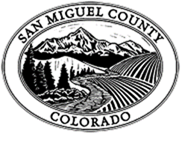
05 Feb SM County Awarded Composting/Food Waste Reduction (CFWR) Grant by U.S. Department of Agriculture (USDA)!
San Miguel County Awarded Composting & Food Waste Reduction (CFWR) Grant by the U.S. Department of Agriculture (USDA).
Comprehensive Compost and Food Waste Reduction Project Awarded $243,497.
For those interested in learning more about San Miguel County’s Composting and Food Waste Reduction (CFWR) program or providing ideas and helping, please contact County Commissioner Kris Holstrom at krish@sanmiguelcountyco.gov.
Go here for more from San Miguel County.

San Miguel County was awarded a $243,497 grant for a Comprehensive Compost and Food Waste Reduction Project by the U.S. Department of Agriculture and the Natural Resources Conservation Service.
The County submitted the grant in collaboration with the nonprofit Zero Foodprint. The grant-funding will focus on creating a County-wide comprehensive plan to reduce food waste and increase compost use throughout the Telluride region.
San Miguel County (SMC) sought funding to establish and enhance the physical and social infrastructure for regional composting and food waste reduction, enhance and expand a sustainable economic framework to facilitate agricultural compost use, and create a replicable model that addresses specific barriers encountered by rural and mountain towns and beyond.
SMC and its partners have been working toward this goal since 2008 and will utilize CFWR’s funding to overcome previously identified barriers and operationalize a scalable program with clear and aligned impact goals.
“San Miguel County is pleased to have been awarded a Composting and Food Waste Reduction (CFWR) grant through the USDA. Many people and organizations have been chipping away at local and regional composting challenges over the years. This grant will help bring those people and entities together with a few new faces to put forward a solid plan and timeline to move local composting and food waste reduction onwards,” said County Commissioner, Kris Holstrom
Holstrom has been involved in regional composting for decades and helped with the grant application.
Holstrom added:
“When this grant notice came out I knew we had a good shot at winning based on the work many folks have put in over the years. From the initial composting effort of Planet Bluegrass over 10 years ago to present-day efforts of institutions including local restaurants, many have been working on the exact things this grant wants to support. I’m thrilled that we will be able to use this funding to provide greater coordination as we further our regional food waste reduction and composting efforts.”
The U.S. Department of Agriculture (USDA) is investing more than $9.4 million in 45 “Compost and Food Waste Reduction (CFWR” cooperative programs that support innovative, scalable waste management plans to reduce and divert food waste from landfills.
The American Rescue Plan Act funds the programs as part of USDA’s broad support for urban agriculture through its Office of Urban Agriculture and Innovative Production (OUAIP).
The USDA prioritized projects that anticipate or demonstrate economic benefits, incorporate plans to make compost easily accessible to farmers, including community gardeners, integrate other food waste strategies, including food recovery efforts, and collaborate with multiple partners.
Grant recipients included projects in 27 states and one territory.
ABOUT U.S. DEPARTMENT OF AGRICULTURE (USDA):
USDA touches the lives of all Americans each day in so many positive ways. Under the Biden-Harris administration, USDA is transforming America’s food system with a greater focus on more resilient local and regional food production, fairer markets for all producers, ensuring access to safe, healthy and nutritious food in all communities, building new markets and streams of income for farmers and producers using climate smart food and forestry practices, making historic investments in infrastructure and clean energy capabilities in rural America, and committing to equity across the Department by removing systemic barriers and building a workforce more representative of America.
To learn more, visit usda.gov.


Sorry, the comment form is closed at this time.